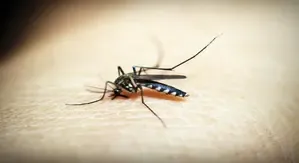Cambodia Approaching Malaria-Free Status, Says PM Hun

Synopsis
Key Takeaways
- Significant decline in malaria cases: 75% drop in 2024.
- Zero malaria-related deaths since 2018.
- Effective treatments like ASMQ are in use.
- Malaria primarily found in forest and mountainous areas.
- Prevention measures include sleeping under treated nets.
Phnom Penh, April 25 (NationPress) Cambodia is making remarkable strides towards its malaria-free objective by the conclusion of 2025, as stated by Prime Minister Hun Manet.
In a message commemorating National Malaria Day on Friday, he noted that the Southeast Asian nation reported merely 355 malaria cases in 2024, marking a significant decline of 75 percent from 2023.
The prime minister also mentioned that the kingdom has recorded zero fatalities from the disease since 2018 and has seen no local cases of Plasmodium Falciparum since 2024.
"Cambodia is on the brink of realizing its malaria-free goal by the end of 2025," Hun Manet urged all stakeholders to continue their support in reaching this target.
Huy Rekol, director of the National Center for Parasitology, Entomology and Malaria Control, stated that malaria diagnostic tests and treatments have proven to be exceptionally effective in Cambodia, with Artesunate/Mefloquine, or ASMQ, being 100 percent safe and effective against malaria, as reported by Xinhua news agency.
"This advancement has positioned Cambodia among the successful nations in eliminating malaria," he informed Xinhua.
Malaria is a mosquito-borne infectious disease typically found in forested and mountainous regions, especially during the rainy season.
To prevent bites from malaria-carrying mosquitoes, Rekol recommends individuals residing in malaria-prone areas sleep under insecticide-treated mosquito nets at all times.
Symptoms can range from mild to life-threatening. Mild symptoms include fever, chills, and headache, while severe symptoms may involve fatigue, confusion, seizures, and difficulty breathing.
Infants, children under 5 years, pregnant women and girls, travelers, and individuals with HIV or AIDS are at an increased risk of severe infection.
Malaria can be prevented by avoiding mosquito bites and through medications. Treatments can prevent mild cases from worsening.
Malaria primarily spreads through bites from infected female Anopheles mosquitoes. Blood transfusions and contaminated needles may also transmit the disease.
The initial symptoms may be mild and resemble various febrile illnesses, making them difficult to identify as malaria.
If left untreated, P. falciparum malaria can escalate to severe illness and potentially lead to death within 24 hours.








